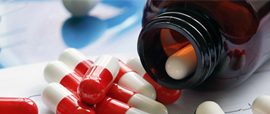Pharmaceutical
General Design and Application Considerations
Moisture control is a great concern in the pharmaceutical industry from product manufacturing to packaging, and from shipping to storage. Some applications for humidity and moisture control in pharmaceuticals relate to microbiological considerations, while many applications relate to processing in order to achieve correct moisture levels that will facilitate the filling of capsules, tablet forming, and packaging.
For example, gelatin capsules are often monitored closely for moisture content to allow them to be sufficiently supple for filling without cracking or breaking in the manufacturing process. Effervescent power manufacturers must maintain tight control of the plant's humidity in order to avoid moisture regain in the powder.
Environmental Standards or Requirements
Manufacturing Process
Millions of caplets, pills tablets and capsules are produced every year. This process involves hygroscopic powders such as the pharmaceutical components and other fillers such as starch and/or sugar. Dehumidification systems are used to prevent moisture regain throughout the manufacturing process.
Pharmaceutical products are sensitive: powders, tablets, capsules and lab sticks often lose quality and shelf life when they come into contact with moisture in the air. The most effective way to protect raw materials and products during production, storage and transport is to control the surrounding environment. Rehoboth can provide custom-designed air dehumidification solutions for every single area of production: The main benefits of this system are that it provides considerable energy and cost savings, incorporating environmentally-friendly technology. Production capacity as well as hygiene conditions improve considerably thanks to the effects of controlled humidity. The Rehoboth dry air system is the simplest, most precise way of achieving and controlling the accurate humidity conditions required.

